Introduction
Noni (pronounced as “noh-nee”) is a type of tree that stays green all year round and has big leaves. It grows in places like the Pacific Islands, Southeast Asia, Australasia, India, and Polynesia. People call it by different names, such as Indian Mulberry, Hawaiian Noni, Tahitian Noni juice, Canary wood, Hog Apple, Cheese Fruit, Vomit Fruit, and Wild Pine. The scientific name for Noni is Morinda Citrifolia, and it belongs to the Rubiaceae family.
Traditional Uses
For many centuries, Polynesian healers have relied on noni fruits to address different health issues. They’ve used them to help with conditions like diabetes, high blood pressure, aches and pains, burns, arthritis, inflammation, tumours, the effects of ageing, and infections caused by parasites, viruses, and bacteria. In old healing writings, noni fruit is mentioned as a key ingredient in natural remedies. Nowadays, you can find noni fruit preparations being sold as juice, in dried “fruit-leather” form, and as a dry extract in capsules.
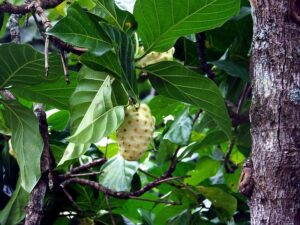
Noni Plant with its Fruit- An Overview
General Uses
Noni has been traditionally used for various purposes. People have turned to it to help with issues like colds, the flu, diabetes, anxiety, and high blood pressure. In Samoan culture, they use all parts of the plant to treat different illnesses, and it’s also one of the most commonly used plants for medicine in Hawaii.
However, it’s essential to note that some claims about noni’s health benefits haven’t been proven in scientific trials. These include using the bark to treat bacterial infections, coughs, infant diarrhoea, and stomach problems. The flowers have been used for sore or irritated eyes, styes, conjunctivitis, eye inflammation, and coughs. The fruit has been suggested for asthma, wounds, broken bones, mouth and throat infections, tuberculosis, worms, diarrhoea, fever, vomiting, eye problems, arthritis, depression, seizures, bacterial and fungal infections, viral infections, and as a general tonic. Some believe that fresh fruit juice may have benefits for cancer. Dried leaves have been used externally for infections, burns, children’s chest colds, and inflammation, and internally for boils, pleurisy, inflamed gums, and arthritis pain. Fresh leaves have been used externally for burns and internally for fevers, bleeding, bacterial infections, and inflammation. Lastly, the roots have been considered for treating oral ulcers, fevers, and cancerous swellings.
It’s important to keep in mind that while noni has a long history of traditional use, more scientific research is needed to confirm its effectiveness for these various health claims.
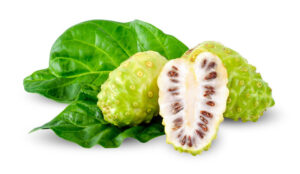
Nutritional Content
Morinda citrifolia, also known as noni fruit, contains various nutrients, but its nutritional profile can vary depending on how it’s prepared and consumed.
In general, noni fruit powder contains carbohydrates and dietary fibre in moderate amounts, primarily in the fruit pulp. The main micronutrients found in noni pulp powder include vitamin C, niacin (vitamin B3), iron, and potassium. It also contains vitamin A, calcium, and sodium in moderate amounts. When comparing noni juice to pulp powder, only vitamin C is retained in a significant amount, with levels around 34 mg per 100 grams of juice. This is approximately 64% of the vitamin C content found in a raw navel orange. Sodium levels in noni juice are relatively high compared to an orange, and potassium content is moderate.
Noni fruit is also rich in various phytochemicals, including lignans, oligo- and polysaccharides, flavonoids, iridoids, fatty acids, scopoletin (a combination used as antibacterial and antifungal compound in traditional medicine.), catechin, beta-sitosterol (a compound which decrease blood cholesterol levels by preventing its intestinal absorption), damnacanthal (a combination found beneficial in traditional treatment of cancer, infection, diabetes, asthma, cough, hypertension, pain, ulcers, wounds, haemorrhoids and rheumatoid arthritis), and alkaloids. While these substances have been studied for potential health benefits, more research is needed to draw definitive conclusions about their effects on human health.
Tahitian Noni Juice, a popular brand, is composed of 89% noni fruit and 11% grape and blueberry juice concentrates. In a 100 ml serving of Tahitian Noni Juice, you can find:
- Calories: 47 calories
- Carbohydrates: 11 grams
- Protein: Less than 1 gram
- Fat: Less than 1 gram
- Sugar: 8 grams
- Vitamin C: 33% of the Reference Daily Intake (RDI)
- Biotin: 17% of the RDI
- Folate: 6% of the RDI
- Magnesium: 4% of the RDI
- Potassium: 3% of the RDI
- Calcium: 3% of the RDI
- Vitamin E: 3% of the RDI
Noni juice, like most fruit juices, is carbohydrate-rich and a good source of vitamin C, which is important for skin and immune health. It also provides biotin and folate, essential B vitamins that play various roles in the body, including energy metabolism.
One notable feature of noni juice is its high levels of antioxidants, including beta-carotene, iridoids, and vitamins C and E. Antioxidants help protect cells from damage caused by free radicals and are believed to contribute to potential health benefits associated with noni juice. However, more research is needed to fully understand these potential health effects.
Benefits (Uses)
Noni Juice has a long history of use as a tropical drink, dating back over 2,000 years among Polynesian sailors. Various parts of the noni plant, including its roots, stem, bark, leaves, flowers, and fruits, have been utilized as traditional remedies for centuries. Noni fruit juice, in particular, is known for its high potassium content and contains essential vitamins like Vitamin C and Vitamin A, along with other bioactive compounds. These components are believed to have potential health benefits, such as repairing damaged cells in the body and boosting the immune system.
People have turned to Noni for various health concerns, including cancer, high blood pressure, improving athletic performance, addressing skin aging, managing diabetes, and treating various other ailments. However, it’s important to note that despite its traditional use and popularity, there is currently limited scientific evidence to support these claimed health benefits.
In summary, Noni Juice has a rich history of traditional use, and it contains nutrients and compounds that may have health-promoting properties. However, more rigorous scientific research is needed to confirm its effectiveness for specific health conditions, and individuals should exercise caution and consult with healthcare professionals before using it as a treatment for any medical condition.
Vestige Noni
VESTIGE NONI or Morinda Citrifolia is a rich source of protein, carbohydrates and high concentration of phytonutrients, vitamins and minerals. It supports overall health and wellbeing. It contains Xeronine, which enables enlargement of pores in the walls of the human cells to allow nutrients to enter and increase the absorption of nutrients. It helps to strengthen the immune system as it contains a number of essential vitamins and minerals. People suffering from respiratory problems may benefit from its consumption. It helps prevent various skin and hair issues. It also helps to promote a healthy digestive system.
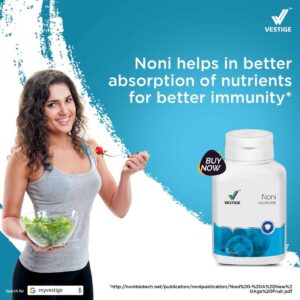
Product Details
Product Name : VESTIGE NONI CAPSULES
Form : Capsules
Net Content : 90 Capsules
Shelf life (Best Before) : 36 months
Country of Origin : India
Company : Vestige Marketing Private Limited
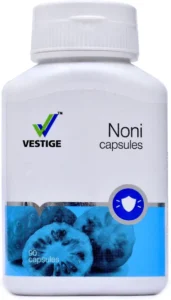
Doses
Each capsule contains Morinda Citrifolia Extract 500 mg
Dosage
One capsule twice a day at least half an hour before meal
Side Effects
There is limited information available regarding the adverse effects of Noni. However, there are some considerations to keep in mind:
-
High Potassium Content:
Noni products, particularly juice, can be high in potassium. For individuals on potassium-restricted diets due to liver or kidney issues, excessive potassium intake can be harmful. It is essential for such individuals to consult with a healthcare professional before using Noni or any supplement containing significant amounts of potassium.
-
FDA Warnings:
The U.S. Food and Drug Administration (FDA) has issued warnings to Noni manufacturers for making health claims that lack sufficient scientific evidence. This highlights the importance of being cautious when using Noni products and relying on scientific research for health-related claims.
While Noni is generally considered safe when consumed in moderation, it’s essential to exercise caution, especially if you have underlying health conditions or are taking medications. As with any dietary supplement or herbal remedy, it’s advisable to consult with a healthcare provider before incorporating Noni into your diet, especially if you have concerns about its potential interactions with your medical condition or medications.
Warning/Disclaimer
The provided disclaimer is comprehensive and serves as an important cautionary note for individuals seeking health information. It emphasizes the following key points:
- Accuracy and Timeliness: While efforts have been made to provide accurate and up-to-date information, no guarantee of accuracy is provided. Medical information can change over time, and this information may become outdated.
- Not Medical Advice: The information presented should not be used as a substitute for the expertise, judgment, and care of healthcare practitioners. It does not endorse specific drugs, diagnose medical conditions, or recommend treatment options.
- Healthcare Responsibility: Individuals should consult healthcare practitioners for personalized medical advice, diagnosis, and treatment. Healthcare decisions should be made based on an individual’s specific medical history and needs.
- No Responsibility Assumed: The website (Healwellbeauty.com) does not take responsibility for any aspect of healthcare administered using the provided materials. This includes possible uses, directions, precautions, warnings, drug interactions, allergic reactions, or adverse effects.
- Consultation with Healthcare Providers: If individuals have questions or concerns about substances they are taking or their healthcare in general, it is advised to consult with a qualified healthcare provider, such as a doctor, nurse, or pharmacist.
Legal Disclaimer
The information on this website is for learning purposes only and is not a replacement for medical advice from a healthcare professional. Since everyone’s needs are different, it’s important to consult with your doctor to see if the information here is suitable for your situation.
Suppliers who list their products on healwellbeauty.com are responsible for making sure the product information is accurate. You should use these products in a safe and lawful way and avoid any illegal activities. The actual product packaging, materials, and design might have more or different details compared to what’s shown here, including things like nutritional information, statements, usage instructions, warnings, and disclaimers.
We recommend reading the product label before using or consuming any products and not relying solely on the information provided on healwellbeauty.com. Before you make any changes to your healthcare plan or treatment, like starting, stopping, or altering anything that your doctor has recommended, it’s important to have a conversation with your doctor or healthcare professional. They can help you figure out the best therapy or course of action for your specific needs. We are not responsible for any side effects, losses, claims, damages, or injuries that might occur from the improper or illegal use of products sold by our suppliers on healwellbeauty.com.
© 2023 healwellbeauty.com All Rights Reserved. Unauthorized reproduction, distribution, or use of this content is prohibited.
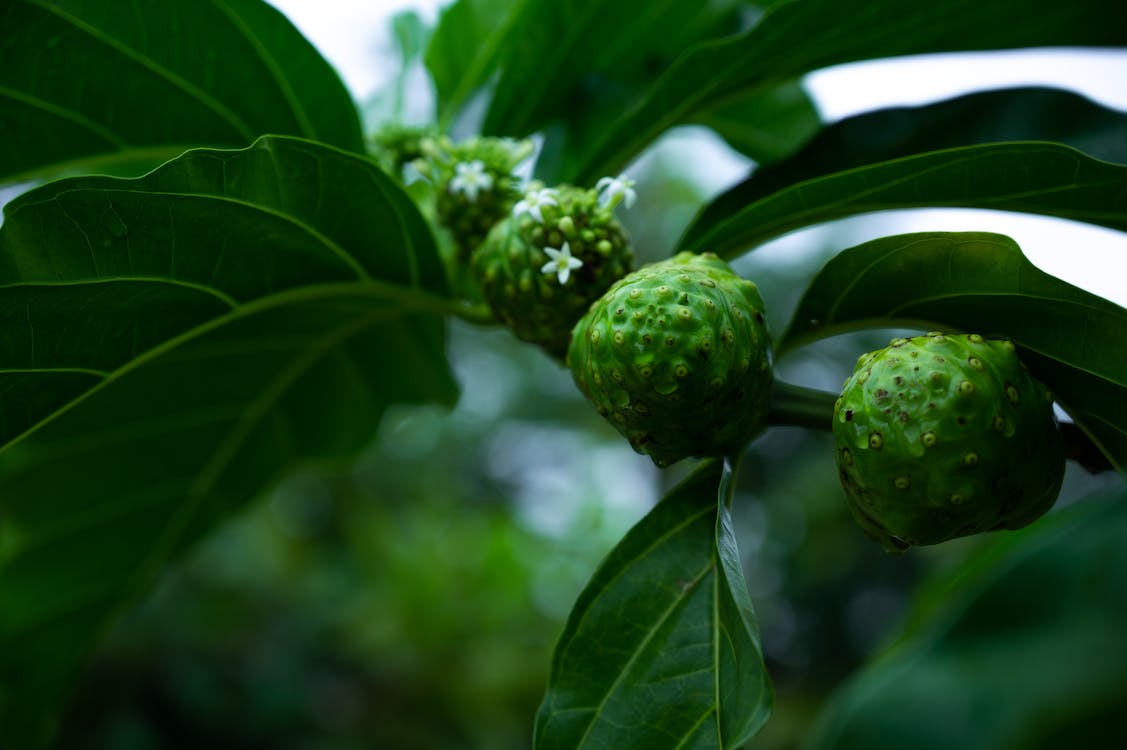
Leave a Reply